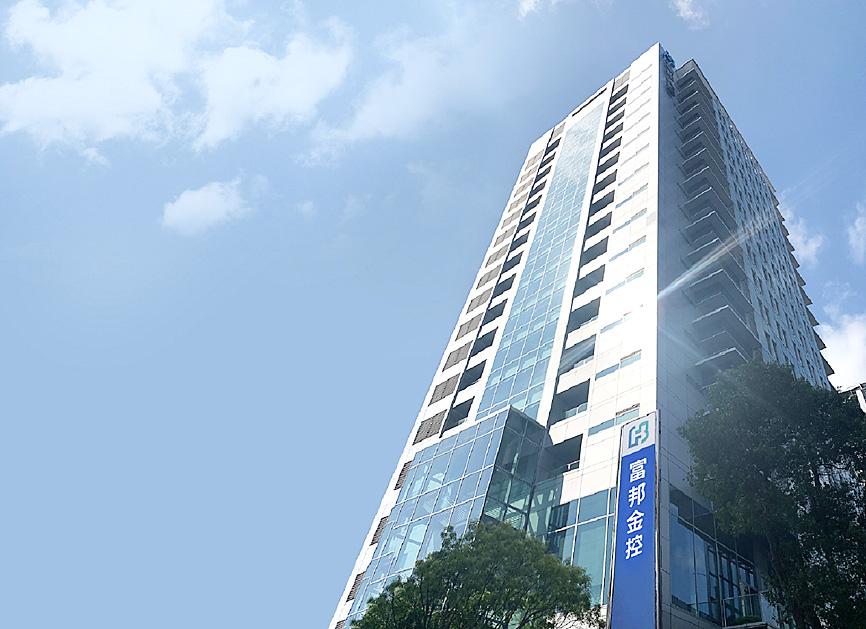Fubon Financial Holding Co (富邦金控) yesterday reported a net profit of NT$4.15 billion (US$139.18 million) for last month and cumulative profit of NT$69.37 billion for the first half of the year, down 67 percent and 20 percent respectively from a year earlier.
The company attributed the decline to Fubon Insurance Co’s (富邦產險) net losses of NT$3.36 billion from compensation for COVID-19 insurance policyholders, compared with a net income of NT$4.29 billion a year earlier.
Its subsidiaries Fubon Life Insurance Co (富邦人壽) and Fubon Securities Co (富邦證券) registered annual declines of 3.6 percent and 64 percent respectively in net income in the first half due to a global equity rout.

Photo courtesy of Fubon Financial Holding Co
Bucking the trend, Taipei Fubon Commercial Bank (台北富邦銀行) reported that net profit expanded 25 percent during the same period to NT$11 billion thanks to interest rate hikes.
Separately, Cathay Financial Holding Co (國泰金控), the nation’s largest financial services provider by assets, reported that net profit in the first six months of the year declined 46 percent to NT$49 billion from a year earlier.
Subsidiaries Cathay Life Insurance Co’s (國泰人壽) net profit was halved to NT$40.2 billion from a year earlier because of lower investment gains, and Cathay Securities Co’s (國泰證券) net profit fell 34.5 percent to NT$740 million because of reduced local stock transactions.
Like Fubon Insurance, Cathay Century Insurance Co (國泰世紀產險) also registered a net loss of NT$2.3 billion for the first six months, as it paid NT$2.1 billion in compensation to COVID-19 insurance policyholders.
Cathay Century Insurance forecast that its total compensation would hit NT$4.13 billion, and to buttress its financial strength, it had submitted an application to use reserves of NT$2.88 billion to write off the losses, it said.
Its risk-based capital (RBC) ratio stood at 460 percent at the end of last month, higher than the regulatory threshold of 200 percent.
For the first half of this year, Cathay United Bank (國泰世華銀行) reported a net profit of NT$13.46 billion, up 10 percent year-on-year, and Cathay Securities Investment Trust Co (國泰投信) reported a record net profit of NT$830 million, up 18 percent annually.

CAUTIOUS RECOVERY: While the manufacturing sector returned to growth amid the US-China trade truce, firms remain wary as uncertainty clouds the outlook, the CIER said The local manufacturing sector returned to expansion last month, as the official purchasing managers’ index (PMI) rose 2.1 points to 51.0, driven by a temporary easing in US-China trade tensions, the Chung-Hua Institution for Economic Research (CIER, 中華經濟研究院) said yesterday. The PMI gauges the health of the manufacturing industry, with readings above 50 indicating expansion and those below 50 signaling contraction. “Firms are not as pessimistic as they were in April, but they remain far from optimistic,” CIER president Lien Hsien-ming (連賢明) said at a news conference. The full impact of US tariff decisions is unlikely to become clear until later this month

With an approval rating of just two percent, Peruvian President Dina Boluarte might be the world’s most unpopular leader, according to pollsters. Protests greeted her rise to power 29 months ago, and have marked her entire term — joined by assorted scandals, investigations, controversies and a surge in gang violence. The 63-year-old is the target of a dozen probes, including for her alleged failure to declare gifts of luxury jewels and watches, a scandal inevitably dubbed “Rolexgate.” She is also under the microscope for a two-week undeclared absence for nose surgery — which she insists was medical, not cosmetic — and is

GROWING CONCERN: Some senior Trump administration officials opposed the UAE expansion over fears that another TSMC project could jeopardize its US investment Taiwan Semiconductor Manufacturing Co (TSMC, 台積電) is evaluating building an advanced production facility in the United Arab Emirates (UAE) and has discussed the possibility with officials in US President Donald Trump’s administration, people familiar with the matter said, in a potentially major bet on the Middle East that would only come to fruition with Washington’s approval. The company has had multiple meetings in the past few months with US Special Envoy to the Middle East Steve Witkoff and officials from MGX, an influential investment vehicle overseen by the UAE president’s brother, the people said. The conversations are a continuation of talks that

CHIP DUTIES: TSMC said it voiced its concerns to Washington about tariffs, telling the US commerce department that it wants ‘fair treatment’ to protect its competitiveness Taiwan Semiconductor Manufacturing Co (TSMC, 台積電) yesterday reiterated robust business prospects for this year as strong artificial intelligence (AI) chip demand from Nvidia Corp and other customers would absorb the impacts of US tariffs. “The impact of tariffs would be indirect, as the custom tax is the importers’ responsibility, not the exporters,” TSMC chairman and chief executive officer C.C. Wei (魏哲家) said at the chipmaker’s annual shareholders’ meeting in Hsinchu City. TSMC’s business could be affected if people become reluctant to buy electronics due to inflated prices, Wei said. In addition, the chipmaker has voiced its concern to the US Department of Commerce